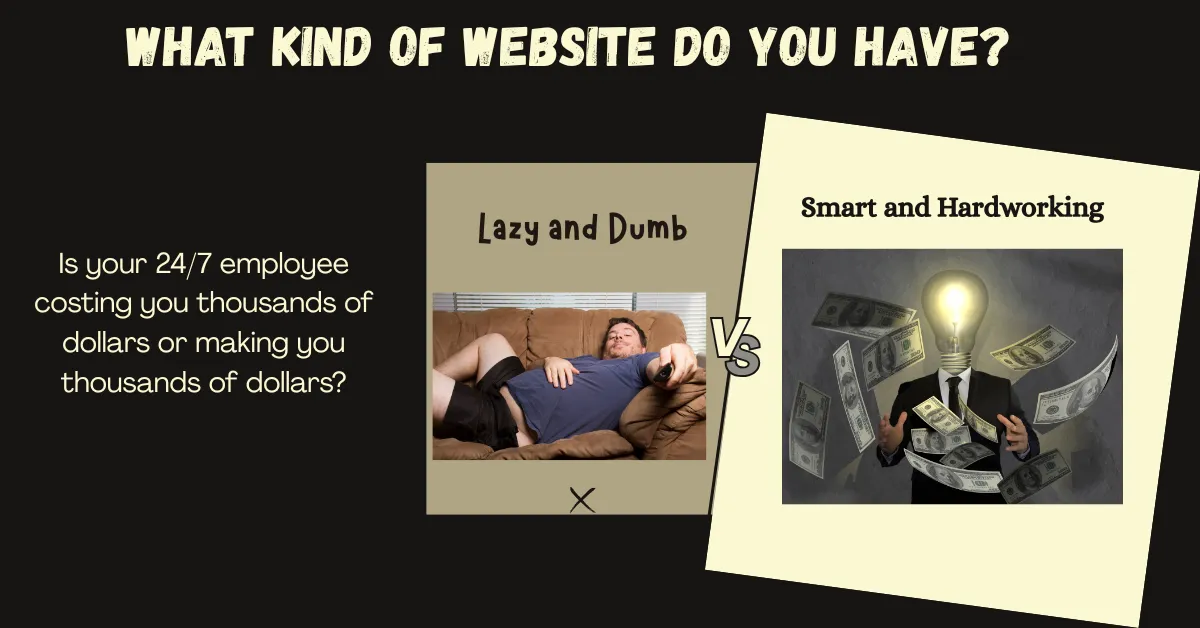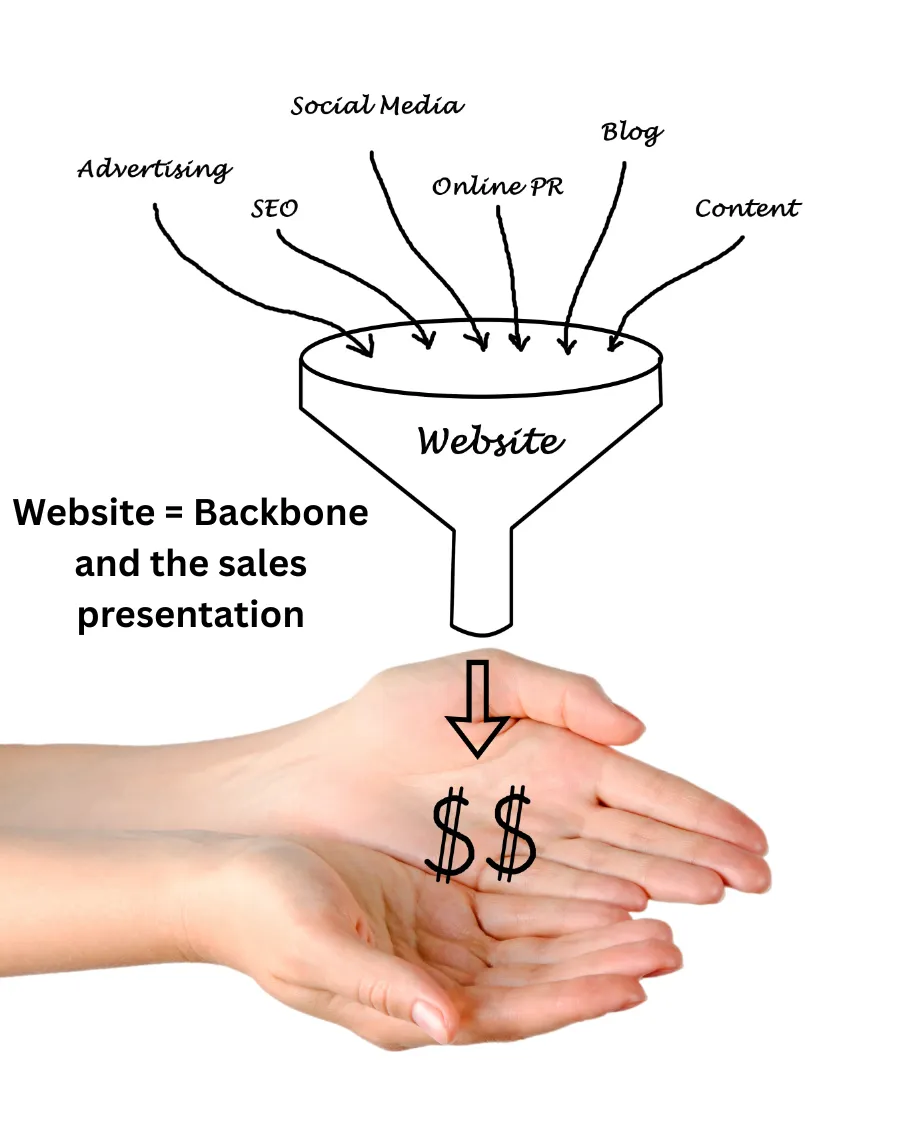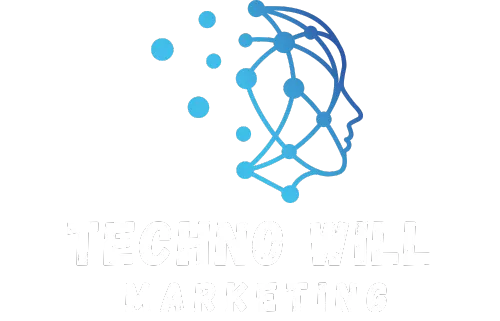What Kind Of Employee Did You Hire?

Imagine having a sales rep who hangs around the coffee table all day, takes super long breaks, and never generates new business.
Actually, worse.
Imagine having a sales rep that here and there talks good about your competitor's business and recommends them to your potential customers, just so they don't have to sell the products and services of your business.
Yeah, you probably fire this salesperson in a heartbeat.
But guess what.
Most business owners have a sales rep that not only does nothing but also sends your potential customers to your competitors.
And that is their website!
But wait... How can a website drive potential customers away, or worse, to your competitors?
Your Website Is the Battlefield

Let’s be real — people research everything nowadays. Even if you’re in a niche that doesn't require much research, most customers will still Google, compare, and read reviews before deciding to go with you or not.
Heck, even cheap products on Amazon are getting review deep-dives and star-rating debates. So, when it comes to investing in a real service, you better believe your potential customers are doing their homework.
Now, where do you think people are going to do their research?
Several places, actually — your Google Business Profile, your social media pages, local listings, review sites, and yes, your website.
But, out of all these places, where do you think you can make the most influence?
Yes, your website.
That’s because people trust your website above all other sources when learning about your business — and it’s the one place where you have unlimited space to showcase everything about what you do.
Your website is the gateway, the battleground, and the realm of influence — the place where you win the trust, attention, and loyalty of potential customers.
But here’s the problem: most business owners give their website little credit. They think it’s doing “good enough,” or that they don’t really need it because business is already steady. So, they never take the time to improve it — even though that’s where most customers form their first impression.
But ignoring your website can be a fatal mistake. It could be the key to earning a lot more money — or the reason your leads end up with your competitors instead.
Is Your Website Attracting or Scaring Away People?
For some odd reason, many business owners think that almost every visitor will read every word, trust every claim, and immediately call or fill out a form.
But this is far from the truth.
In reality, people don’t read every word on a website. They scan, spend only a few seconds, and rarely fill out a form on the first visit. Most visitors compare multiple websites — yours and your competitors’ — to quickly decide which one seems the most trustworthy and professional.
The business — or businesses, in cases where customers are comparing multiple bids or options — that comes out on top is the one they’ll spend time on, explore in more detail, and ultimately contact.
The business — or businesses, in cases where customers are comparing multiple bids or options — that comes out on top is the one they’ll spend time on, explore in more detail, and ultimately contact.
Now here is the good news.
You can absolutely influence this decision-making process. The reality is, most businesses don’t put the time or effort into optimizing their websites. That means if you focus on improving yours, you’ll immediately be ahead of the majority of your competitors.
Is Your Website a Salesperson or a Couch Potato?
For some odd reason, many business owners think that simply having a website is enough — that visitors will read every word, trust every claim, and immediately call or fill out a form.
With your website you can:
Build Extreme Credibility: Your website gives you unlimited space to showcase everything about your business — your services, expertise, story, reviews, and results. It’s where you prove you’re the real deal.
Generate leads: When optimized correctly, your website can attract visitors through Google, local SEO, and even new AI search tools — turning traffic into consistent leads.
Capture lead information and Follow Up: With contact forms, quote requests, chat widgets, and more, your website can capture visitor information and even follow up automatically.
Stand Out: Through stunning design, persuasive messaging, and authentic content, your website helps you stand out from the competition and leaves a lasting impression.
Keep Information Organized & Easy to Access: Your website structure and navigation make it easy for visitors to find exactly what they need — building trust and improving your chances of conversion.
Now, of course, for your website to actually do all this effectively, it has to be built right.
But let’s be honest — most business owners don’t care. Either they’re too busy, they don’t know what to look for, or they’re already doing “well enough.” But if you’re here reading this, chances are you’re not settling for “good enough.” You want to grow.
Your website gives you virtually unlimited space to showcase everything about your business — your services, expertise, story, and proof of results, etc. Beyond visibility, your website can capture valuable lead information, build credibility through strong design, and organize large amounts of content if you build the navigation system right.
The problem though is people don't use a website to its full potential.
For some odd reason, many business owners think that simply having a website is enough — that visitors will read every word, trust every claim, and immediately call or fill out a form.
The truth is the opposite.
And, if your competitors have a much better website than you, you're just handing them leads without a fight.
Just check out the following stats to see what I mean:
On average, users spend about 45-54 seconds on a website overall (across industries) — indicating that if they don’t get engaged quickly, there’s very little time to convince them.
Another study shows that within 2-3 seconds a visitor has already scanned your homepage and decided whether you’re credible and worth their time.
And then here is one more study: 91% of users visit multiple websites when evaluating businesses; 80% of those say they visited on average 2-4 sites before picking one.
And for those who don't have a website, you're not excused!
And for those who don't have a website, you're not excused!
Not having a website is like running your business with no one at the front desk—no one to greet visitors, answer questions, or close deals.
Now for some, having a website might not seem like a huge deal.
And you probably wondering "my website is not so bad" or "what's the big deal of not having a website?".
But think again.
Times and technology are always changing.
More and more people are going online to find businesses.
If you don't have a great website that stands the test of time, then you will be blown away by the storm.
Everyone goes online to look for and learn about businesses.
We all know that.
But a lot of business owners don't realize how much of an impact a website can have on the purchase decision of a buyer.
Most people think a buyer will come to your website, read your it like it's some brochure or flyer, and once they see you provide what they want, they will just pick up the phone or fill out a form to contact you.
But that is not how people buy.
What people do is people do a ton of research.
And they will specially do a TON TON of it, if you're product(s) or service(s) have a high price tag.
Tell me the last few times you made purchases from businesses; did you not also do research before ever making a decision?
Another thing people do is compare businesses to other businesses (either the competition or an alternative product).
They will compare everything from their social media profiles, Google Business Pages, reviews, and yes, your website.
I mean, people are doing extensive research and comparisons for simple 5-dollar products on Amazon.
You don't think they will be doing the same for businesses in your industry?
But here's the crazy part.
Not only are people always doing research and comparing your business to others, but they are also always BUSY and get easily DISTRACTED.
People can be doing research about your business in the moment one day and then next thing you know, a few minutes later, they are looking at a cat video.
Then they will say something like "I'll just finish the research later this week when I have more time".
Then life gets in the way, and they never get around actually buying that thing anyways.
Another opportunity lost to time and lethargy.
So, as you can see, there are 4 key things you must addre
And it is your website that can make the biggest difference.
Why?
3 main things:
Your website is the place where people trust the most for your information, giving you the opportunity to persuade and set yourself apart.
Your website can capture lead information so you can follow up on them.
And now with AI, your website can come to life and bring interactibility to your website with a chatbot that instantly responds to people questions and concerns and can even gather lead info and book appointments!
If you can provide valuable information, make yourself stand out, and respond fast to people, it is very likely that you will be the one winning the business.
What About My Business and Social Media Pages? Isn't That Enough?
A lot of people think having a business page on Instagram, Google, or Facebook is enough to win customers—but it’s not.
First off, you don’t actually own those platforms. Your Instagram, Facebook, or Google profile can be taken down anytime—and getting them back isn’t easy.
Second, people just trust a website more and they are always looking for one to seek information about your business.
I'm not saying that having social media or business pages are a bad thing.
As a matter of fact, I believe you should have them as they are good extensions for your business.
But in the end people will almost always end up on your website to get the full picture.

You know how they say, "all roads lead back to Rome"?
Well, in the modern era all roads lead back to your website.
Think about the last time you needed to make a purchase decision and went searching online for businesses.
Tell me, did you also end up checking out their websites?
Now, your website won't be the only one people take a look at.
If you have competitors, potential customers will compare your website to theirs—and decide which one feels more worth their time, trust, and money.
What will happen if your competitors have a full-blown website that sells, and you don't?
Yeah, I'm sure you know the answer to that.
But, what if it was the other way around?
What if your website was a full blown sales machine?
Now think about this.
If all roads—your ads, social media, emails, referrals—lead back to your website.
AND
Your website will be compared to the competition.
AND
Your website is the best place to deliver the highest amount of credibility, information, and persuasion as possible.
THEN
Doesn’t it make sense to make your website as beefy as possible?
In other words, do you want your website to be a simple brochure that people just quickly read and forget about, or do you want it to be a full-blown sales presentation?
people are going to go to your website to seek trust, recent information, and a reason to do business with you and choose you over the competition.
Make that moment count.
How Businesses Are Throwing Thousands of Dollars' Worth of Marketing in the Thrash

Many business owners and even digital marketers themselves believe that generating as much traffic as possible is the best way of getting leads.
Businesses will invest thousands of dollars in stuff like SEO, Google ads, Facebook ads, content marketing, social media marketing, and all other kind of traffic generating sources in hopes of getting more leads.
More traffic = more sales.
Right?
Yes, but that is not the entire equation.
The other part of the equation is converting traffic into sales.
Traffic + high conversion = more sales.
If you focus solely on traffic, you will see that not only, will you be spending a ton of money trying to get that traffic, you'll also see a lot of that traffic just slipping away.
Why?
Because your website is the salesperson responsible for closing the deal.
You can send a ton of people walking to your business, but, if you don't have a solid salesperson to persuade and close deals, then a lot of those people will just turn away and go elsewhere.
So, what's the point of investing in all that traffic if your website sucks or doesn't make a big impact to turn that traffic into customers?
Why spend all that money driving traffic if your competitors are the ones stealing it under you because their website looks more professional and trustworthy?
Spending money on traffic without a solid website is like going fishing with no bait—and no bucket to keep the fish from jumping back into the water for your competitors to catch.
A Smart Website That Sells
Remember Will, the lazy secretary + "sales rep" bum in the beginning of this writing?
He was an example of a website that is dumb and lazy.
It does nothing to get leads or turn them into customers.
So, what kind of website do you need if you want more leads and customers?
A smart website that sells of course.
Here are 4 things that a website should do to consider it a smart selling website:
It should actively get you leads.
It should persuade those leads and turn them into customers.
It should follow up on leads who have not bought yet.
Responds to leads questions and concerns on real time and can even book appointments or gather lead information.
Wait... How does a website get you leads, persuades people, follows up on them, and then even answer their questions and even books appointments or people's information?!?!
Sounds almost like an actual salesperson, huh?
With the power of AI, great web design, and following great copywriting or persuasive writing principles, you can turn a boring, lazy, and ineffective website into one that has life and sells.

Here is a deeper and more detailed comparison between a dumb ineffective website vs a smart website that sells:
Dumb and lazy website:
It’s not designed to help you pop up at the top of places like Google and Bing—or appear in AI-driven results from tools like ChatGPT and Gemini.
The content falls flat— it's lifeless, generic, and forgettable. It doesn’t build trust, spark interest, or give people a reason to choose you over the competition.
It looks cheap and unpolished. The text is difficult to read, and the layout doesn’t keep people focused—it’s easy to lose interest.
The buttons and lead forms (if there are any) aren’t enticing to click on or fill out, making it easy for visitors to leave without taking the next step.
There’s no knowledge base or FAQ section to offer helpful, valuable information that builds trust, credibility, and positions your business as an authority.
No chatbot that automatically responds to leads through chat or voice calls. (Some websites do have a chatbot but doesn’t interact or responds to leads).
A website like this makes it easy for potential customers to forget your business, question your credibility, and choose a competitor that looks more trustworthy and appealing.
Smart and hard-working website:
The content and structure of the website are fully optimized to rank at the top of search engines and AI-generated responses — bringing in high-quality leads on autopilot.
Design is modern, attractive, and simple. It doesn't distract the visitor and makes it easy for them to focus on your content that sells.
It has persuasive content that sparks interest, feels personal, and makes your business memorable.
It easily captures leads with enticing calls to actions and forms. That way you can follow up on leads either in person like through a phone call or through email messages or text.
Follows up on leads over time so they eventually turn into customers/buyers.
A chatbot agent that follows up with leads and a voice AI agent that follows up on calls that cannot be picked up by a human. These agents also can book appointments!
As you can see, this type of website is like having a professional salesperson and secretary that works for you 24/7 that gets you leads, responds to question/concerns, and help you close them.
A website like this doesn't only literally boost your sales, it also makes your life a lot better by cutting down on customer service time and the amount of sales effort you have to put to close a lead.
That's because a smart website that sells would have answered a ton of questions and concerns and done a ton of the persuasion for you before a lead gets in touch with you.
So, What Kind of Website Do You Want?

So now I ask you my friend, do you want a dumb and lazy employee that costing you thousands every time customers seek out your business or a smart and hardworking one that revolutionize your business?
The choice is yours of course.
But here's one last thing to keep in mind.
Just like a diamond, a website is forever.
So, investing in a website is like owning the golden goose—it keeps delivering value, day after day for an eternity.
If you're interested, hit the button below and let's started right away!
